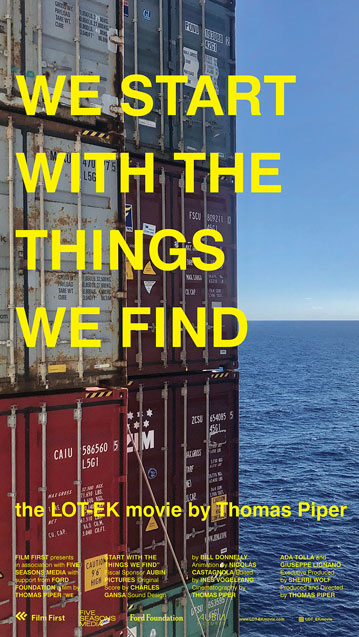About We Start With The Things We Find

Join us for the Portland premiere of We Start With The Things We Find, a documentary that will change the way you view the ordinary, the extraordinary, your own existence in a world increasingly shaped by globalization and, of course, the humble shipping container. Stick around after the film for a Q&A with the film's director, Thomas Piper, the two visionary designers behind LOT-EK, Ada Tolla and Giuseppe Lignano, and hosted by McMenamins' own lead architect, George Signori.
About the film
If we pay enough attention to the ordinary, we see the extraordinary. The shipping
container is an accidental icon of our modern age: the eight-foot-by-forty-foot corrugated
steel box that brings the world to our doorstep. It brings all our hearts’ desires’, available
for purchase. And it brings us complicity in the global supply chains, and all the economic,
ecological, technological, and political systems that forge those chains, as those great
container ships link maker and user, buyer and seller, China and America together across
the vast distances of the lawless sea. The design studio LOT-EK is a visionary practice at
the intersection of art and architecture, that specializes in upcycling, which is the art and
science of repurposing, remaking, rethinking, reimagining. Of using old things in new ways.
The shipping container is the thing that has captured their imagination for over a
quarter-century: they have remade containers into homes, schools, galleries, libraries, and
more. With hundreds of millions of obsolete and unused containers around the world, this
is a new and necessary architecture of the future, that repairs and regenerates the
unnatural environment that we have inherited from the past. WE START WITH THE
THINGS WE FIND is a feature-length documentary of this vision, and of the soulful lifelong
partnership of the people, designers Ada Tolla and Giuseppe Lignano, behind it.
WE START WITH THE THINGS WE FIND shows us a way to be radically optimistic,
creative, and construc-tive during times that can feel the opposite of all that. Director
Thomas Piper’s acclaimed documentary feature Five Seasons: The Gardens of Piet Oudolf
showed how wild and unfavored plants could encourage audiences to live more
responsibly with nature, and now he looks at living more smartly and sweetly with the
effects of industry, infrastructure, and technology. Taking us from spark-filled workshops to
a container ship sea voyage over a shimmering sea; and explaining all the prosaic and
poetic design thinking behind how LOT-EK brings the container to life, the film shows how
all we have can become all we need, how resourceful subsistence can feel like beautiful
abundance, and how to keep going when we now know there is no such thing as a fresh
start. The film is a humanist essay not only about a new kind of design thinking, but about
a new design for life.
